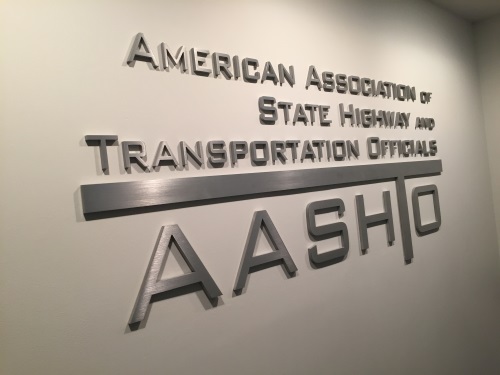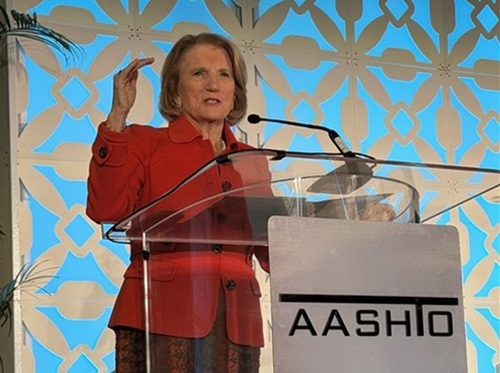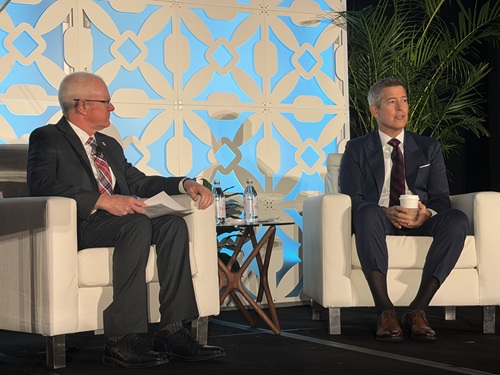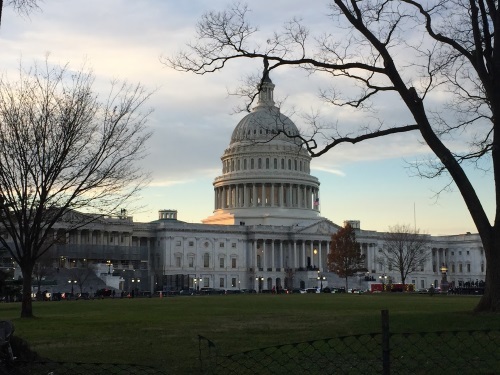The Senate Committee on Appropriations approved its fiscal year 2025 Transportation, Housing and Urban Development, and Related Agencies Appropriations or THUD bill on July 25 by a vote of 28 to 1. A summary of the bill issued by the committee can be found here.
[Above photo by AASHTO]
That legislative package provides the U.S. Department of Transportation with more than $110 billion in total funding, of which $81.6 billion is from obligation limitations for trust fund programs and $28.5 billion is for discretionary funding.

According to analysis by the American Association of State Highway and Transportation Officials, the Senate’s THUD bill funding total is generally in line with the Biden administration’s proposal for USDOT and provides 13 percent higher discretionary funding compared to the FY 2025 transportation bill issued by the House of Representatives in late June.
AASHTO noted that the Highway Trust Fund (HTF) obligation limitation and the Infrastructure Investment and Jobs Act (IIJA) advance appropriations from the General Fund are consistent with the amounts authorized for FY 2025 in IIJA.
Most notably, AASHTO said that unlike the FY 2025 THUD bill passed by the House Committee on Appropriations, the Senate bill includes an update to Section 120 that provides a legislative fix to August Redistribution starting the summer of 2025.
As recommended by AASHTO in a letter sent this June to Congressional leadership, the bill assigns four-year obligation limitation to all allocated HTF programs, including allocated programs that receive four-year contract authority and allocated programs that receive “no-year” or “never expiring” contract authority.
According to an earlier USDOT estimate, that move is expected to gradually reduce August Redistribution from the $8.7 billion expected this year to about $2.5 billion three years from now in FY 2027, while correspondingly increasing obligation limitation provided to state formula programs at the beginning of the fiscal year by a similar amount.

The reason such large August Redistribution amounts presents a difficult challenge to state DOTs is that it requires them to process 15 percent of a year’s worth of federal highway funds in just 30 days.
“AASHTO appreciates the committee’s inclusion of a legislative solution to address the Federal Highway Administration’s August Redistribution of highway dollars,” noted Jim Tymon, AASHTO’s executive director, in a statement.
“The solution in this bill should reduce the amount of funding subject to August Redistribution and provide more of the state formula dollars at the beginning of the fiscal year, allowing states to adequately plan out projects to best serve the needs of their communities,” he said.
Meanwhile, key funding allotments within the Senate’s THUD bill include:
- The THUD measure provides $63.1 billion for federal-aid highways, which includes $61.3 billion in funding from the HTF and an additional $1.1 billion for Highway Infrastructure Programs. The bill provides $400 million for the competitive bridge bundling grant program and $150 million for the Tribal Transportation Program, $100 million for the Appalachian Development Highway System; $25 million for the federal Active Transportation program; and $20 million in grants for Scenic Byways, among other surface transportation investments.
- More than $550 million would go to the Rebuilding American Infrastructure with Sustainability and Equity or RAISE discretionary grant program. When combined with the $1.5 billion in funding for the initiative contained in the IIJA, the RAISE grant program will see $2 billion in total funding in FY 2025.
- The FAA would receive $22 billion for the FAA, an increase of $1.9 billion over FY 2024. That includes more than $13 billion for operations so the agency can hire a further 2,000 new air traffic controllers or ATCs; improve ATC training facilities; and hire 55 new aviation safety inspectors.
- The bill provides $4.5 billion for Airport Improvement Program or AIP grants to improve airport infrastructure and safety, with $70 million set aside for the new Per- and Polyfluoroalkyl Substances or PFAS replacement program for airports.
- The Federal Railroad Administration would receive $3.5 billion, which includes $2.6 billion for Amtrak to sustain operations, maintain a state of good repair, and safely get passengers to their destinations – an increase to Amtrak of $210 million over FY 2024. A total of $100 million is allocated to the Fed-State Partnership Program and $475 million for the Consolidated Rail Infrastructure and Safety Improvements or CRISI grant program.
- The THUD bill also increases funding for FRA’s Safety and Operations budget to $293 million, allowing the agency to expand its rail safety inspector ranks to a record 400 positions, while increasing funding for rail research and development to $54.75 million.
- The measure provides $17 billion for the Federal Transit Administration, including more than $2.3 billion for Capital Investment Grants or CIGs, which is a $57 million increase over FY 2024. When combined with the $1.6 billion in IIJA appropriations, a total of $3.9 billion is available for CIGs in FY 2025.
- In an effort to improve access to financing for transit-oriented development, the THUD bill establishes an interagency task force between USDOT and the U.S. Department of Housing and Urban Development to leverage the expertise of each agency and accelerate housing development opportunities.
- The THUD measure includes $25 million to supplement the Rural and Tribal Infrastructure Advancement Pilot Program to deliver financial, legal, technical, and project development assistance in an effort to improve tribal access to transportation infrastructure programs at USDOT. It provides $150 million to the FHWA’s Tribal Transportation Program and $500,000 for transit technical assistance for tribes. The bill also includes a cost share waiver for the Rural and Tribal Formula Program as proposed in the budget request, and a cost share waiver for tribes participating in the Low and No Emission Vehicle grant program.
 Top Stories
Top Stories
Congressional Leaders Detail Key Transportation Priorities
February 27, 2026 Top Stories
Top Stories

